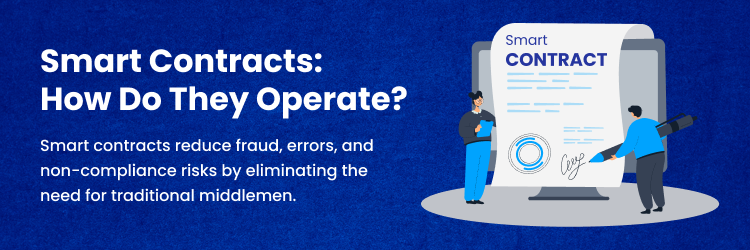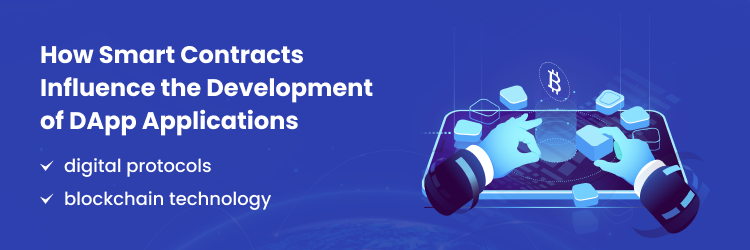Smart contracts brought about a significant and fundamental shift in the methods of conceiving and carrying out agreements, which revolutionized the blockchain landscape. The first use of smart contracts in DApp wallet development services was introduced by Ethereum, which provided smart contracts to ensure the creation of programs on blockchain networks. Beyond decentralized financial transactions, smart contracts allowed dApps to be developed for a variety of use cases, increasing the use of blockchain technology.
In recent years, a plethora of platforms with unique functionalities that enable the hosting of smart contracts on blockchain have emerged. The way that smart contracts and the blockchain interact has promoted innovation in the web3 and blockchain domains. Let's take a closer look at how smart contracts affect DApp wallet development services.

Smart Contracts: How Do They Operate?
Smart contracts are digital, automated versions of traditional legal contracts that execute terms and conditions using software code stored on a decentralized blockchain network. These contracts are impermeable, eliminating the need for intermediaries like banks or attorneys. They function as autonomous software that takes appropriate action when predetermined conditions are met, allowing for immediate payment upon delivery confirmation.
Smart contracts reduce fraud, errors, and non-compliance risks by eliminating the need for traditional middlemen. Ethereum's blockchain technology has made them popular in industries like supply chain management, real estate, and banking. Smart contracts are deterministic, replicating uniformly among blockchain network nodes, ensuring orderly and transparent implementation. However, significant testing and auditing are required before deployment to prevent potential faults or vulnerabilities due to the immutability of smart contracts.
What Makes Smart Contracts Crucial to the Blockchain?
Blockchain is an innovative technology that is having a big impact on the transformation of finance. Smart contracts enable peer-to-peer exchanges and eliminate middlemen, which expands the potential uses of blockchain technology. The primary focus of the analysis of smart contracts' place in the blockchain is its ability to build secure systems and increase transaction transparency.
A smart contract is permanently recorded with the assurance of inherent immutability after it is registered on the network. Moreover, the decentralization of smart contracts ensures protection against attacks on single points of failure. Additionally, it ensures that users won't have to worry about system disruptions caused by security issues.
How Do Smart Contracts Fit Into the Dapp Wallet Development Process?
Because of the benefits of boosting efficiency, automation, and security in an enterprise Blockchain development company, smart contracts are essential to the blockchain. You can gain a better understanding of smart contracts' role in blockchain technology by learning about their applications in different industries. For example, smart contracts in the financial services sector could speed up banking processes and increase payment speed. Smart contracts can streamline loan disbursements and enable automated financial transfers by eliminating intermediaries.
Supply chain management may be impacted by how blockchain technology and smart contracts work together to improve transparency and traceability. Apart from guaranteeing a reduction in mistakes, smart contracts can help automate and authenticate every stage in the supply chain. The healthcare sector may benefit from safe and interoperable patient data sharing thanks to smart contracts.
In just a few seconds, smart contracts can instantly provide access to patient permission, which can enhance the management of medical records. Blockchain development can also leverage smart contracts to facilitate beneficial use cases in real estate. Smart contracts help to prevent delays and conflicts while also making real estate transactions simpler and more secure.

How Smart Contracts Influence the Development of DApp Applications
Smart contracts are digital protocols stored on a blockchain that are designed to automatically facilitate, validate, and carry out a contract's terms. Smart contracts, the core of blockchain technology, completely transform the concept of contracts with their integrated automated features.
By creating and implementing smart contract terms on the blockchain, the system becomes autonomous. The contract automatically implements certain clauses when certain conditions are met. Unlike their traditional versions, which can be costly, time-consuming, and manipulable, smart contract leagues have this crucial feature. As opposed to this, once smart contracts are put into place, they cannot be altered. This ensures that the terms of the contract are upheld even in the absence of a trustworthy third party, which reduces the possibility of fraud and disputes.
To create smart contracts, one must be knowledgeable with blockchain technology, programming languages, and creating Smart contract. Blockchain professionals with experience in creating smart contracts are crucial to this process because they guarantee that the code accurately reflects the contractual criteria and operates flawlessly within the current blockchain ecosystem.
Smart contract implementation is commonly achieved through the use of blockchain platforms like Ethereum, which were designed with smart contract execution in mind. Because developers can now select from a range of platforms to meet their specific needs, smart contracts are expected to play a significant role in digital contracts and impact future transactions in the industry.
Pixel Softwares: The Perfect Blockchain Development Firm
Pixel Softwares is a leading DApp wallet development company offering comprehensive blockchain services worldwide. With a team of skilled blockchain engineers and smart contract specialists, they provide customized solutions to meet the unique needs of various sectors. Here we understand the importance of smart contracts in the advancement of blockchain technology, as they automate and enforce agreements, ensuring efficiency, security, and transparency in business processes.
Pixel Softwares research and development staff stay updated on the latest developments in smart contract technology, allowing them to manage all business needs, including building decentralized applications, crafting unique smart contracts, and integrating blockchain technology with existing systems.
Conclusion
In the process of developing blockchain technology, smart contracts are essential because they set the precedent for blockchain development. Blockchain is now a major player in the development of DApp wallets because of smart contracts.
For businesses and entrepreneurs looking to capitalize on these advancements, partnering with experienced blockchain development firms like Pixel Softwares can provide invaluable expertise and tailored solutions to navigate the complexities of smart contract integration and Dapp wallet deployment.
Stay tuned as Pixel Softwares continues to explore the forefront of blockchain technology, empowering businesses to leverage smart contracts for scalable, secure, and transparent Dapp solutions. Join us on this revolutionary adventure toward a decentralized future.